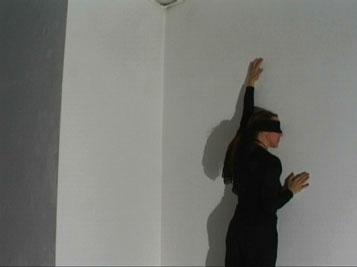In between
dal 27/5/2002 al 2/6/2002
Segnalato da
27/5/2002
In between
Lethaby Gallery, London
Presence, representation, memory? As it happens with images or sounds, the process of perceiving and memorising smells is filtered by subjectivity. Moreover, we may remember a scent in relation to the 'colour' of the experience we associate it to.

Elena Cologni
Supported by Central Saint Martins College of Art & Design Research Centre and School of Art;
Università dell'Immagine, Milan; Dragoco New York; OIKOS, Milan.
Presence, representation, memory? As it happens with images or sounds,
the process of perceiving and memorising smells is filtered by subjectivity.
Moreover, we may remember a scent in relation to the 'colour' of the experience
we associate it to. This phenomenon is explored through the interactive colour-
scent installation 'Senses - Drawing Scent' which, like the other pieces in the
show, was developed as part of the Ph.D. 'The identity of the real in relation
to the experience and representation of space'.
In the pieces presented,
different ways of collecting and storing material about experiences of the
artist in relation to her own reflected/represented image, the audience or the
environment, merge in a reoccurring single Art-making process dynamic.
'The position I take in the production of the work is in between two viewpoints:
inside and outside, the creative subjectivity and the analytic objectivity implied
in research. This involves a constant shift between the roles of both artist and
audience I play in the art-making process. My work has evolved under a variety
of influences. Among them are Jacques Lacan's concept of the gaze, 'le regard',
and Maurice Merleau-Ponty's concept of 'chiasm'. The similar approach of the
two authors to the relationship subject-object of vision has been particularly
stimulating to my artistic production.
Their theorisation, placed by Martin Jay in
the critical discourse against the system of Western philosophy which he defines
'ocularcentric', together with the historical account given by Jonathan Crary on
the evolution of the role of the spectator, has made me understand the relevance
of the physiological and neurological aspects in such discourse. One of the
consequences on my work is the fact that, in order to satisfy the paradoxical
desire to put myself in the position of the Lacanian 'Other' from which I am seen,
I keep shifting my position to find in the 'transition', in between roles, a stable
condition.'
Image: Public Private Perceptions 02, DVD live installation, neon gallery Bologna Italy ,
still from live action
For further information about the Lethaby Gallery, please contact Chris Wainwright,
telephone 020 7514 7200 or email c.wainwright@csm.linst.ac.uk or visit the Central
Saint Martins Website at www.csm.linst.ac.uk
Lethaby Gallery
Southampton Row
London



